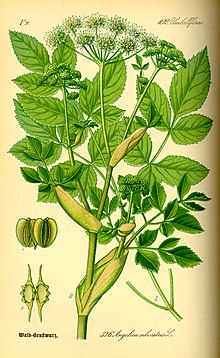| Wild angelica | |
|---|---|

| |
| Conservation status | |
 Least Concern (IUCN 3.1) | |
| Scientific classification | |
| Kingdom: | Plantae |
| Clade: | Tracheophytes |
| Clade: | Angiosperms |
| Clade: | Eudicots |
| Clade: | Asterids |
| Order: | Apiales |
| Family: | Apiaceae |
| Genus: | Angelica |
| Species: | A. sylvestris |
| Binomial name | |
| Angelica sylvestris L. | |
Angelica sylvestris or wild angelica is a species of flowering plant, native to Europe and central Asia. An annual or short-lived perennial growing to a maximum of 2.5 metres (8.2 ft), it has erect purplish stems and rounded umbels of minuscule white or pale pink flowers in late summer.
Habitat and ecology
The Latin specific epithet sylvestris means "growing in woodland". However it tolerates a range of conditions including fields, hedgerows, open woods, marshes and fens. It will grow in light (sandy), medium (loamy) and heavy (clay) soils.
It has recently been determined to be an invasive weed in New Brunswick and Cape Breton, Nova Scotia, Canada. "According to the New Brunswick Invasive Species Council, unless this species is controlled, Woodland Angelica could spread throughout Canada, overwhelming other vegetation." The flowers are visited by a wide array of insects and are thus characterised by a generalised pollination system.
Adult wasps of Dolichovespula norwegica are known to feed off the nectar provided by A. sylvestris.
Cultivation and uses
A. sylvestris is cultivated in gardens. The cultivar 'Ebony', with pink flowers, has gained the Royal Horticultural Society's Award of Garden Merit.
It was used as a vegetable until the 20th century. The plant can be stored. The stem was eaten fresh, and the leaves could be boiled to a stew for storage or cooked with milk. The plant has also been used for dyeing.
Gallery
References
- Lansdown, R.V. (2014). "Angelica sylvestris". IUCN Red List of Threatened Species. 2014: e.T19620785A19621071. doi:10.2305/IUCN.UK.2014-1.RLTS.T19620785A19621071.en. Retrieved 19 November 2021.
- "Woodland Angelica - Angelica sylvestris". Archived from the original on 17 September 2011. Retrieved 4 August 2011.
- Brickell, Christopher, ed. (2008). The Royal Horticultural Society A-Z Encyclopedia of Garden Plants. United Kingdom: Dorling Kindersley. ISBN 9781405332965.
- Harrison, Lorraine (2012). RHS Latin for Gardeners. United Kingdom: Mitchell Beazley. ISBN 978-1845337315.
- "Invasive species going wild in the Saint John River Valley". Archived from the original on September 27, 2011. Retrieved August 4, 2011.
- "Woodland Angelica - Angelica sylvestris". New Brunswick Invasive Species Council. Archived from the original on September 17, 2011. Retrieved August 4, 2011.
- Van Der Kooi, C. J.; Pen, I.; Staal, M.; Stavenga, D. G.; Elzenga, J. T. M. (2015). "Competition for pollinators and intra-communal spectral dissimilarity of flowers". Plant Biology. 18 (1): 56–62. doi:10.1111/plb.12328. PMID 25754608.
- "Dolichovespula norwegica". Ecology of Commanster. Archived from the original on 2014-10-06.
- "RHS Plantfinder - Angelica sylvestris 'Ebony'". Royal Horticultural Society. Retrieved 12 January 2018.
| Taxon identifiers | |
|---|---|
| Angelica sylvestris |
|





